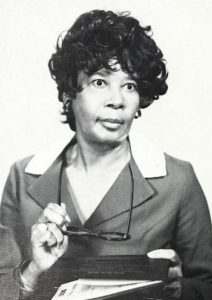|
Early Life and Education: Mary Francis Fair Burks was born in 1915 in segregated Montgomery, Alabama. Growing up in Montgomery during the 1930s, she defied the Jim Crow system by insisting on using white-only elevators, rest rooms, and other facilities in what she called “her own private guerilla warfare.” At eighteen, she earned her Bachelor of Arts in English Literature from Alabama State College, now Alabama State University, in 1933. A year later, she received a Master of Arts in English Literature from the University of Michigan. She returned to Montgomery to teach at the Alabama State Laboratory High School, and then taught at the college. In the late 1940s she became Chairperson of the English Department at Alabama State College and later earned her doctorate in education at Columbia University. Activist Throughout her Life: Mrs. Burks was not allowed to join the League of Women Voters, and after being subjected to racist police policies, she formed the Women’s Political Council (WPC) in 1946. She and her group, the WPC, petitioned the city regarding their mistreatment on the city buses, but to no avail. That WPC began to consider the possibility of boycotting Montgomery buses prior to Rosa Parks’ decision not to give up her seat on a Montgomery bus which sparked the bus boycott on December 1, 1955. Mrs. Burks realized that women were the most affected by the humiliation, degradation, racism, anger and conditions on the buses, and not men because men drove the family cars to work. It was those humiliating experiences that prompted Mrs. Burks to begin the WPC that worked within the community to educate individuals about their constitutional rights and encouraged them to vote. The WPC consisted primarily of professional women that fostered leadership opportunities for women and purposely excluded men because men would have taken over the movement. In 1953, the WPC met with the City Commission and lodged complaints about the treatment of black passengers on the city’s buses, because the bus company’s loosely defined seating policy varied from route to route and driver to driver. African Americans were frequently required to shift their seats when ordered to do so by white drivers. They were also compelled to get on at the front door of the bus to pay their fare, then get off and then reboard at the back or side door, instead of simply being allowed to walk down the aisle. Drivers sometimes moved off before black passengers had time to reboard which resulted in the loss of their fare as well as the loss of their ride for which they had paid. The WPC was later joined by the Reverend Dr. Martin Luther King, Jr. and the National Association for the Advancement of Colored People (NAACP), as the WPC continued to ask for a redress of grievances from the City Commission and to end discrimination on city buses and other forms of transportation. Mrs. Burks was a member of Dexter Baptist Church, which was ministered by Dr. King, and when he established a Social and Political Action Committee at Dexter, he encouraged church members to support the NAACP and to become registered voters. Burks and others joined it as well. When Rosa Parks was arrested and the bus boycott began on December 1, 1955, Mrs. Burks and the members of the WPC typed, duplicated and distributed flyers and leaflets, informed the black community, and organized car pools to transport workers for the originally planned one-day bus boycott. The boycott eventually lasted over a year, and blacks walked, carpooled, and hired black-own-ed taxis and car services instead of using city buses despite the violence, intimidation and legal pressure exerted by the City of Montgomery. In December of 1956, the United States Supreme Court ruled Alabama’s segregated bus systems unconstitutional, which ended the boycott. Due to her civil rights activities and those of her cohorts, Mrs. Burks and others were investigated by a State-appointed com-mission, and political pressure was exerted upon them by the school’s administration via the State. Mrs. Burks gave up her leadership position in the WPC, but unfortunately, that did not save her position as Chairperson of the English Department at Alabama State College or employment there. The college’s president publicly announced that he would fire or purge those involved with the protests. On March 31, 1960. Mrs. Burks wrote to her pastor, Reverend Dr. Martin Luther King, Jr. and asked his assistance in helping her find employment for the fall. He responded on April 5, 1960 to her letter and stated that he would help her to find some possibilities for the next school year. Mrs. Burks left her beloved home in Montgomery, moved to the Eastern Shore of Maryland and found employment at Maryland State College, now the University of Maryland Eastern Shore (UMES), in Princess Anne, Maryland. She wrote articles on contemporary Black writers, won teaching awards, and numerous professional honors and fellowships. She did post-graduate study at Harvard University, Oxford University in the United Kingdom, the Sorbonne in France, and other leading universities. At UMES, she continued to engage in political activism and worked to encourage citizens to register to vote. She helped to establish community organizations and groups, coordinated hospital volunteers, exemplified and taught etiquette less-ons, culture and style, served on the Maryland Arts Council, founded two African American historical societies, and remained active until her death on July 21, 1991. Mrs. Burks was so very close to people of power and influence that she was usually the person to introduce them when they visited the UMES campus. For example, when Reverend Dr. Martin Luther King, Jr. or Mrs. Coretta Scott King, and some others visited UMES, Mrs. Burks introduced them, and it was said by some that her introduction of them was usually longer than their speeches. Mrs. Mary Francis Fair Burks was an educator, a scholar and a civil rights activist, but she was also definitely a force to be reckoned with wherever she lived.
0 Comments
Leave a Reply. |
Archives
July 2024
Categories |


 RSS Feed
RSS Feed
